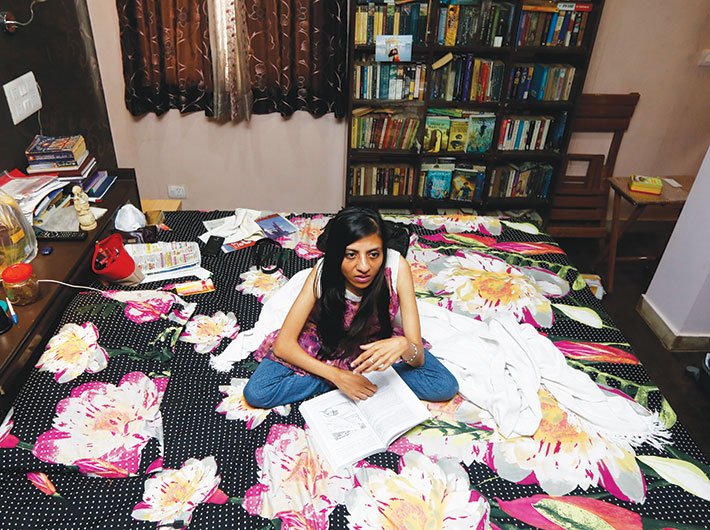It took four successful attempts and as many years of fight for differently-abled Ira Singhal to be finally accepted into the coveted services
She is yet to undergo the essential training at Mussoorie to become an Indian administrative service (IAS) officer. But within 96 hours of the union public service commission (UPSC) declaring the results of the 2014 civil services exams on July 4, Ira Singhal, 31, had started to make a difference. The news of her becoming the first physically challenged person to top the exam has not only media flocking and politicians warming up to her, but also indifferent government departments galvanised into action.
Four days after the UPSC results were announced, Singhal was invited by union minister of social justice and empowerment Thaawar Chand Gehlot for a meeting at Vigyan Bhavan. The minister not only felicitated her but also said she could be the brand ambassador for the schemes and programmes of the recently set-up department of disability.
During the meeting, the secretary of the department of empowerment of persons with disability, Lov Verma, assured her that issues faced by persons with disabilities while appearing in competitive examinations would be addressed soon. The secretary also promised that his department would proactively ensure that seamless guidelines were available for such persons.
The ministry also issued a press release stating that the department will work in consultation with UPSC, staff selection commission, university grants commission and other educational bodies to ensure that the guidelines help and promote the cause of persons with disabilities to achieve their inclusion, participation and empowerment.
Singhal, who qualified the exam on three occasions earlier, has, however, had to cross many roadblocks to reach the top.
She is the same Indian revenue service (IRS) officer who was not allowed to join the service despite her securing 815 rank in the civil services examination (CSE) 2010. Not just that, the department of personnel and training (DoPT) order dated April 26, 2012, cancelled her candidature for allocation of service on the basis of CSE-2010. The reason: her spine-related disorder, scoliosis. She has been suffering from scoliosis since childhood. It had rendered her 62 percent locomotor-disabled, in a way that she cannot fully twist and move both her arms.
She reappeared for the CSE in 2011 and 2013 as well and got ranks in the range of 800. “However, there was no communication from the DoPT on those two occasions, perhaps because my case was pending before the central administrative tribunal (CAT),” said Singhal, who has also worked as a Spanish teacher for a year as well as a manager in Cadbury India and a marketing intern with Coca-Cola India.
“They said I did not fit the functional classification for the post of IRS (customs and central excise) that were allowed for physically handicapped candidates. This was a clear violation of my rights as defined under the Persons with Disabilities Act Articles 14 and 16 and I decided to take the matter to the CAT,” said Singhal.
Singhal’s medical report indicated that her arms and spine had been impacted by the disease, limiting her ability to pull, push and lift. Since the customs and central excise (C&CE) rules did not include provisions for appointing “both arms-affected persons” the DoPT objected to her appointment as an assistant commissioner. IAS allowed such a person to join the service, but Singhal did not have sufficiently high rank to be transferred to IAS cadre.
Roadblocks
“It is difficult to accept those who are physically different. However, a majority of people are just curious as I look different because of my short height (four feet five inches) and the deformity. But I have got used to it,” she said.
“The bigger issue is the discrimination faced by the differently-abled at all levels – at home, in school, college and workplace. People feel that those with physical disabilities also have problems with their mental health. This is a bigger problem and it is universal,” said Singhal, who has travelled widely.
Despite her qualifications – computer engineering from Netaji Subhas Institute of Technology and MBA (marketing and finance) from the Faculty of Management Studies (University of Delhi) – the ground for rejection for the IRS was the question about her ability to lift certain weight.
Singhal went on to reappear for her medical test before the chairman of the central standing medical board at New Delhi’s Safdarjung hospital and lifted 10 kg weight with one hand to prove that her disability was partial and her case should be treated differently from those with severe impairment in the limbs or those with disability due to amputation of both arms. Luckily, the CAT also expressed its concern on the importance of lifting a heavy weight by an IRS officer. “The officer is always accompanied by other staff during raids or inspectors when there may be a need to lift certain load,” the CAT observed in its order.
On January 24, 2013, the Central Board of Excise and Customs clarified that it had no objection to allocating IRS (C&CE) cadre to Singhal and finally, the CAT in an order dated February 25, 2014 gave a favourable judgment paving way for her appointment. “However, this was done on a case-to-case basis and not through amendment in the specific rule. This means that someone like me will have to battle the same set of rules again. But they may not have the financial muscle and family support to fight it out,” she said.
She had also planned to file a PIL had she not got a favourable CAT judgment. “However, I am now in service and I am sure with this newfound attention, I’ll be able to push through reforms for more inclusiveness and acceptability of the differently-abled in the country,” Singhal told Governance Now.
“I have been fortunate enough to have a family that never looked at me or brought me up differently. I was brought up as an equal to my brother. In fact, after we lost my brother in 1994, people asked my parents how they will manage with a girl child. My father clearly told them that I was no less than a son for them.”
But Singhal had her share of challenges in dealing with society. When her father filled up the form for the Modern School, Barakhamba, “the principal asked my parents to put me in a special school for the differently-abled, as I was not ‘good enough’ to study with the others,” said Singhal. She went on to top the Loreto Convent School in Class 10 exams. Later, she shifted to the Army Public School, Dhaula Kuan, to complete her Class 12 with good grades.
“Accept who you are and never pity yourself. Unless you believe in yourself why will the world believe in your capabilities? Even family and friends have to stop pitying a differently-abled person. Had my parents not ensured that I go to a regular school, I would never have realised my potential on an equal footing with the fully-abled,” said Singhal.
parth@governancenow.com
(The article appears in the July 16-31, 2015 issue)

